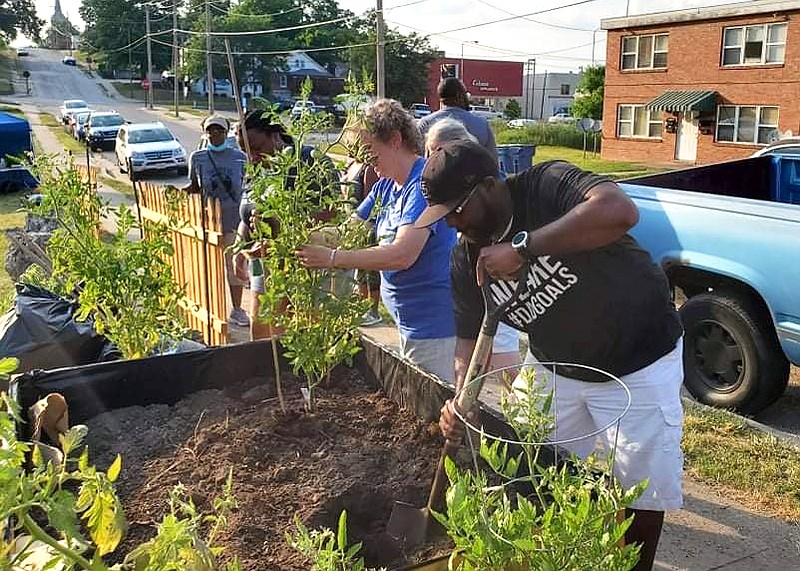Jennifer Ferguson started gardening about five years ago, using containers to grow simple plants like tomatoes and lettuce. When she wanted to make the plunge into building an outdoor garden, she found she wasn't able to use her land, which was rented with her apartment. She was told by her landlord she could garden, but come growing season, they didn't give her permission to use their water access.
"It's not just me in this situation," Ferguson said.
In areas where people are renting their space or simply don't have access to extra land, gardening opportunities, aside from potted vegetables, can be few and far between. This sparked an idea for Ferguson.
Over a year ago, she started developing the idea for a garden that can be used by the community to practice becoming self-sufficient food growers, despite financial ability or skill level. "Ubuntu" is an African word meaning "I am because you are" - the name was chosen for the garden to emphasize its heart for the community, helping people to grow together.
In order to prepare for the organization, she and members of a board, made up of fellow gardeners and concerned citizens, participated in 2020 in Neighborhood Leadership Academy through MU Extension, where Ferguson learned about the many aspects and people it takes to make moves on a project. That summer, they were able to gain access to the land where they currently host Ubuntu Community Garden classes (and where the gardens sit today).
"One of the biggest things I've learned is just how important your positive relationships with community members are," Ferguson said. "It's been a big learning process for us. I've never done anything like this."
Growing up at the top of East Ashley street, with her grandparents and parents being leaders in the local Black community - she helped her family operate Michael's Unforgettable Barbeque and learned how to garden from her grandfather - it was important for Ferguson to reach back into the community that supported her. She hopes the garden, located on the same street she grew up on, can help foster a sense of community across Jefferson City while people learn new gardening skills.
"Unless you're catching up at church, you don't get to sit down and know other people these days," Ferguson said. "I hope to help people become more self-sufficient and gain those skills."
Along with bringing people together, gardening can keep methods of sustainable living alive "that can get lost over time," she said, adding many people during the pandemic have realized how fragile the global economic structure can be. Ferguson's own interest in medicinal uses of plants has taught her about natural remedies - even among native plants, like purple cone flowers.
"People think they have to order items from a company in California - when you can grow them at home," Ferguson said. "I've been realizing what was in my yard! You'd be surprised. There are things medicinally available to us that we don't know about."
Right now, Ubuntu Community Garden's long-term goal is to build up its site with beds that are easily accessible to the community, to make the space accessible for people with disabilities and put in an orchard where community members can find foods they wouldn't get in the city. They have been hosting classes, bringing in plant professionals to lead each subject. In the fall, Nadia Navarrete-Tindall, an associate professor at Lincoln University and a native plant specialist, will be teaching more about native plants.
One audience that has been most excited to learn about gardening has been children. Ferguson looks forward to fostering that excitement to build social development in children through gardening as a patience-building opportunity. She has heard multiple youngsters comment on seeing their plants grow - "Every time we drive by, I see the tomatoes," one child told her.
"As a society, we have a lot of people complaining about kids being on their phones or TVs," she said. "One of the best ways to help kids' mental health is to have the opportunity to slow down and get their hands dirty. It's not like (the phone app) Farmville - nothing grows in two minutes."
Like plants, Ferguson is OK with slow growth. Ubuntu Community Garden is currently raising $1,100 to become a 501(c)(3), but she wants those who donate once or make monthly donations to do so out of their own volition.
"I'm a fan of organic growth, not forcing people into a thing," she said. "I'm really taking my time and allowing the product to grow."
In her own journey with the benefits of gardening - economically, socially and for a community - she knows Ubuntu Community Garden could blossom into something bigger.
"This could change the lives of a lot of people," Ferguson said.
Information about Ubuntu Community Garden, including its monthly classes, how to get involved and to sign up for its newsletter, visit www.ubuntucommunitygarden.com. They will be meeting every third Saturday of the month through the fall for free classes and advice from local experts.

